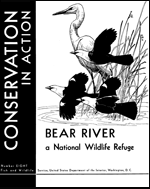United States Fish and Wildlife Service

United States Fish and Wildlife Service: Publications
Date of this Version
2007
Abstract
We describe an approach to dynamically couple a fish bioenergetics-based population dynamics model to the NEMURO lower trophic level nutrient–phytoplankton–zooplankton model. The coupled models, denoted NEMURO.FISH and configured for Pacific herring (Clupea harengus pallasii) on the west coast of Vancouver Island, are capable of simulating the daily dynamics of the lower trophic levels and the daily average weight and numbers of individual herring in each of 10 age classes over multiple years. New recruits to the herring population are added each June based on either constant recruitment or dynamic recruitment generated from an environmental Ricker spawner–recruitment relationship. The dynamics of the three zooplankton groups in the NEMURO model determine the consumption rate of the herring; herring consumption affects the zooplankton, and egestion and excretion contribute to the nitrogen dynamics. NEMURO was previously calibrated to field data for the West Coast Vancouver Island. Thirty-year simulations of herring growth and population dynamics were performed that used repeated environmental conditions for the lower trophic levels of NEMURO and historical environmental variables for the herring spawner–recruit relationship. Herring dynamics were calibrated to the west coast of Vancouver Island such that the coupled models reasonably duplicated observed herring weights-at-age and total herring biomass. Additional 30-year simulations under constant recruitment with herring coupled and uncoupled from NEMURO clearly showed the effects of the feedback mechanism between the two models and also showed that herring have small to moderate effects on their prey. Monte Carlo uncertainty analysis showed the importance of feeding- and respiration-related parameters to predicted individual and population herring growth. The utility of theNEMURO.FISH framework for improving our understanding of climate change effects on marine ecosystem dynamics is discussed.


Comments
Published in Ecological Modelling 202 (2007 ) 144–164